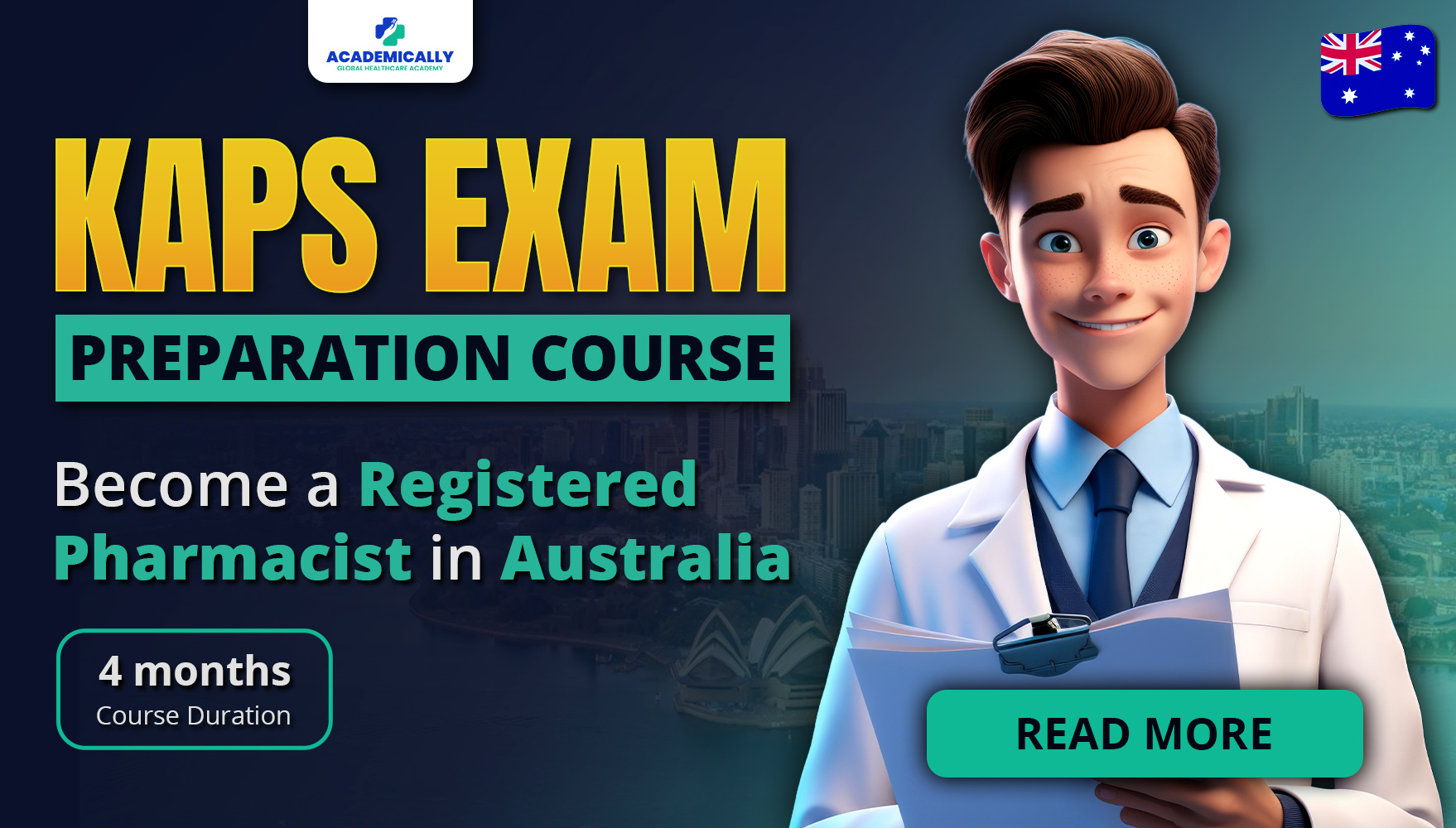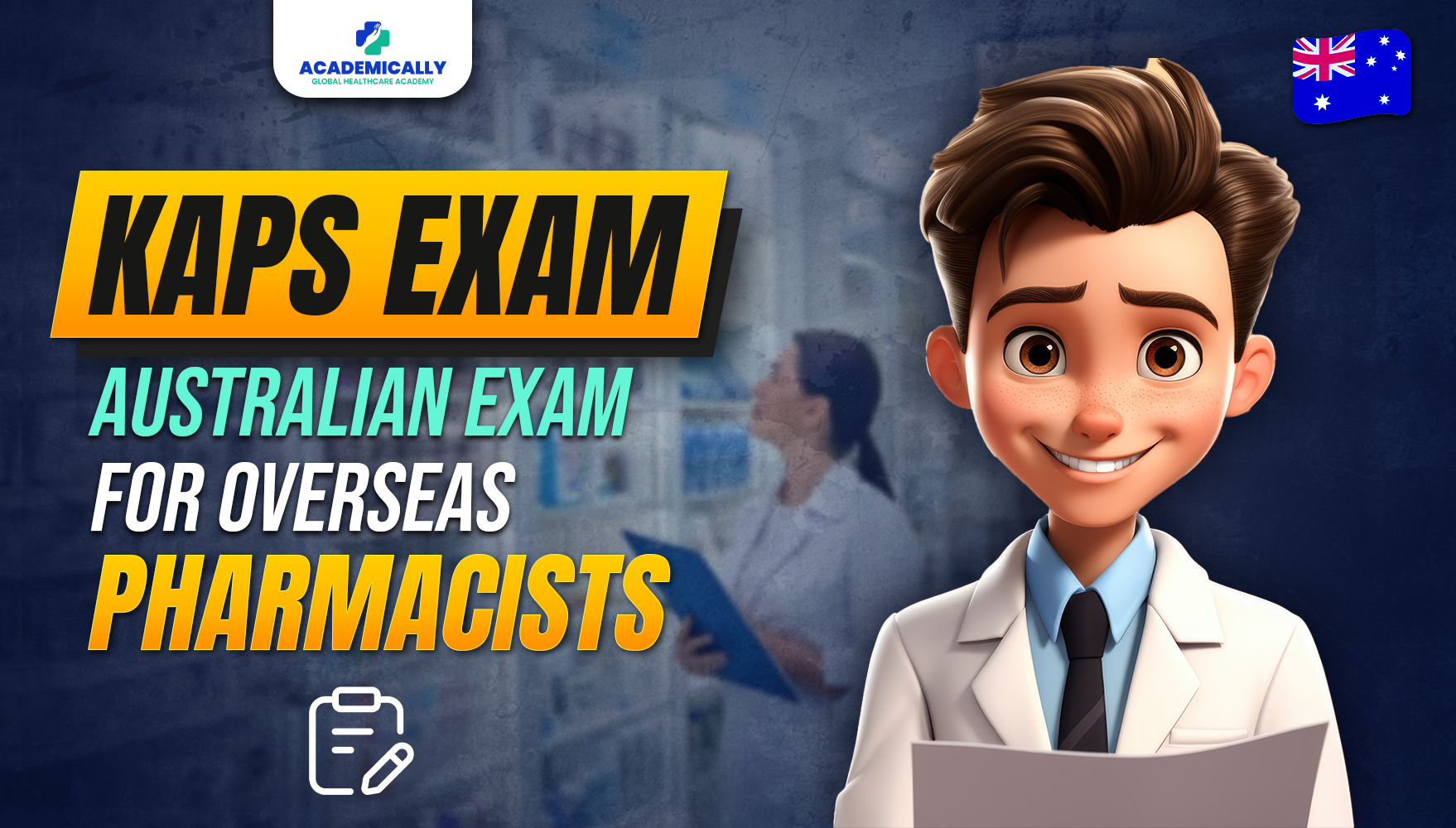If you are an internationally qualified pharmacist aspiring to practice in Australia, one of the essential milestones in your journey will be passing the KAPS exam (Knowledge Assessment of Pharmaceutical Sciences). This is the Australian Examination for Pharmacists.
Administered by the Australian Pharmacy Council (APC), the KAPS exam is crucial to achieving your dream of becoming a registered pharmacist in Australia.
The exam assesses the knowledge and competency of internationally qualified pharmacists to determine if they meet the necessary standards to practice pharmacy in Australia.
This blog will explore what the KAPS exam entails, its significance, and how you can prepare for success.Key Takeaway:
- The International Student Stream Skills Assessment by the Australian Pharmacy Council (APC) is a mandatory process for international pharmacy students in Australia
- Passing the assessment signifies readiness to contribute to Australia's healthcare system, allowing candidates to apply for registration and pursue a fulfilling pharmacy career.

Introduction
Australia's vibrant healthcare sector attracts a diverse pool of international students seeking to pursue a rewarding career as pharmacists. Aspiring pharmacists often opt for the International Student Stream Skills Assessment, a crucial step towards obtaining their professional registration in Australia.
Let us understand the process and significance of this assessment.
What is the Australian Pharmacy Council?
The Australian Pharmacy Council (APC) is an independent and non-profit organisation that was founded in 1982. It acts as the national accreditation authority for pharmacy and training. Their primary functions include the following.
- Skill Assessment
- Accreditation of Programs and Providers
- Protection of Public Health
The Australian Pharmacy Council plays an integral role in maintaining high standards in the pharmacy sector and ensuring the delivery of safe and effective pharmacy practice, contributing to the overall protection of public health.
Significance of the Skill Assessment
The Australian Medical Council is committed to indigenous health and prioritises the improvement of health outcomes. The mission and vision of the Australian Pharmacy Council include the advancement and assurance of quality in pharmacy education. They also handle accreditation and assessment of education of the pharmacy sector nationally and internationally.
This role of the Australian Pharmacy Council creates safety, efficiency, and effectiveness in the pharmacy practice in the Australian context. They make sure that quality is not compromised at any point and make sure that they have respect, fairness, and transparency in everything that they do.
This is how Australia has one of the most reliable and robust healthcare systems in the world.
Understanding the International Student Stream Skill Assessment
The International Student Stream Skill Assessment is a mandatory evaluation conducted by the Australian Pharmacy Council (APC). Its primary purpose is to assess the qualifications and competencies of international pharmacy graduates intending to register as pharmacists in Australia. This assessment ensures that international students meet the standards required to deliver safe and effective pharmacy services in the country.
The International Student Stream Skill Assessment is the pathway that helps students in requesting a skill assessment outcome. This is applicable for the candidates who have completed their pharmacy degree at an accredited institution in Australia as an international student, or in New Zealand.
Who can Choose the International Student Stream Skill Assessment
The following eligibility criteria should be fulfilled if the candidate is choosing the International Student Stream Skill Assessment Pathway.
The process is applicable if:
- The candidate studied as an international student in Australia or a student in New Zealand.
- The candidate holds a pharmacy degree that is either an approved program or a substantially equivalent qualification from Australia or New Zealand
- The candidate wishes to migrate to Australia or begin or continue working as a pharmacist in Australia
The International Student Stream Skill Assessment Process
The candidate undergoes three main phases as part of the International Student Stream Skill Assessment:
- The phase before the application
- The phase of application for the skill assessment outcome
- The phase after the application
Before the Application
Before the candidate applies for the International Student Stream Skill Assessment, it is important that he checks his eligibility to apply for the same. The candidate should make sure that he/she
- Holds a pharmacy degree that is approved in Australia and New Zealand
- Has studied as an international student in Australia, or studied in New Zealand
The candidate must also provide the required documents to the Australian Pharmacy Council. This is necessary to prove that he/she meets the eligibility criteria and verify the claims present in the application.
Application for the Skill Assessment Outcome
Once a candidate profile has been set up and a skill assessment eligibility check has been requested, the candidate may upload the required documents. The documents submitted should be accurate and correctly prepared. Then they may proceed to the fee payment. The payment will be accepted through debit cards and credit cards. The card used for the payment must be issued by a bank in the candidate's country of residence.
After the Application
The Australian Pharmacy Council takes about 8 weeks to complete the eligibility check of a candidate. If the candidate leaves out any document or sends the wrong ones, there will be a delay in the process.
The candidate must also provide other information as required by the Council. The candidate will be given 6 months to provide the additional information.
After the process is complete, the Australian Pharmacy Council will email the candidate or the agent a copy of the skill assessment outcome.
When the skill assessment outcome is received, the candidate can use it to apply to the Department of Home Affairs to support a visa application.
Conclusion
The International Student Stream Skills Assessment serves as a gateway for international pharmacy graduates to realise their dream of becoming pharmacists in Australia. Through rigorous evaluation of academic qualifications and other factors, this assessment ensures that the Australian healthcare system continues to benefit from skilled and competent pharmacists from around the world. By understanding the process, staying determined, and seeking support when needed, aspiring pharmacists can confidently navigate this assessment and embark on a fulfilling and impactful career in the Australian pharmaceutical landscape.
Purpose of the KAPS Exam
The primary purpose of the KAPS exam is to ensure that foreign pharmacists possess the necessary knowledge and skills to provide safe and effective pharmaceutical care in the Australian healthcare system.
It aims to assess their competence in pharmaceutical sciences, pharmacy practice, and relevant regulations.
Eligibility Criteria
To be eligible to sit for the KAPS exam, foreign pharmacists must meet specific criteria set by the APC.
The following are the basic requirements required to apply for KAPS Exam:
- B.Pharma/PharmD degree or provisional degree
- Transcripts/Mark sheet (BPharm/PharmD)
- State pharmacy council registration from home country
- Passport
- Work experience (optional, but beneficial)
Also, it will take about 12 weeks to complete the eligibility check. So make sure you don't provide the wrong documents or leave any out because then the process will take longer than usual.
KAPS Exam Format
Here's a detailed breakdown of the KAPS exam structure for your better understanding.
Exam Structure
The KAPS exam consists of two separate papers, both to be taken on the same day. Each paper comprises 100 multiple-choice questions covering both theoretical knowledge and practical application.
You will have two hours to complete each paper, with a scheduled 30-40 minute break between Paper 1 and Paper 2. During this break, you are allowed to leave the exam venue, access personal belongings (such as your mobile phone, exam notes, and study guides), have food and drink, and even study if you wish.
Before the exam starts, you will be given 15 minutes to familiarize yourself with the exam tutorial. At the end of the exam, there will be a 5-minute window for you to complete a feedback survey.
It's important to manage your time efficiently during the exam, as returning late from the break means you will not receive extra time to complete the remaining part of the exam. So, be sure to adhere to the specified break time to ensure you have ample time for both papers.
Exam Content
Each KAPS exam is divided into two papers, each focusing on specific areas of pharmaceutical sciences:
Paper 1
This paper comprises 100 multiple-choice questions, with a distribution of 30% Pharmaceutical Chemistry and 70% Physiology and Pharmacology.
The questions in this section will test your understanding of the chemical aspects of pharmaceuticals and their interactions within the human body.
Paper 2
The second paper also consists of 100 multiple-choice questions, with different emphasis. It covers 30% Pharmaceutics, which involves the study of drug formulation and delivery, and 70% Therapeutics, which delves into the application of drugs to treat various diseases and medical conditions.
Exam Scoring
To successfully pass the KAPS exam, candidates must meet the following requirements:
- Obtain a minimum score of 50% in all subsections of the exam.
- Achieve an overall mark of at least 50%.
By meeting these criteria, candidates demonstrate their competence in the pharmaceutical sciences and their ability to provide safe and effective pharmaceutical care in the Australian healthcare system.
Conclusion
The KAPS exam plays a vital role in maintaining high standards of pharmacy practice in Australia and safeguarding the well-being of its citizens. As foreign pharmacists endeavour to meet these requirements, thorough preparation and dedication are key to unlocking opportunities in the vibrant and rewarding landscape of Australian healthcare.
By meeting the challenges posed by the KAPS exam, foreign pharmacists gain access to a world-class healthcare system and contribute their knowledge and skills to improve the lives of patients and communities across the country. Through this examination, the Australian healthcare system continues to benefit from the diverse expertise and dedication brought in by talented pharmacists from around the world.
Fill up this form for a free one on one counselling session.




